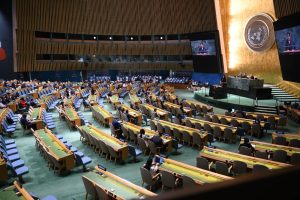Since their forced displacement in 2017, the Rohingya Muslims residing in Bangladesh’s refugee camps have seen little progress toward a lasting solution to their plight. Due to shifting global geopolitical priorities, international attention has moved on; donors are turning away and funding cuts are getting deeper, leaving over a million refugees in acute hardship, entirely reliant on humanitarian aid. United Nations agencies supporting the Rohingya refugees have often warned that the funding shortfall will disrupt the basic humanitarian needs, leaving many to take desperate measures that could pose more challenges for the countries of the region.
Bangladesh is currently hosting an estimated 1.2 million Rohingya refugees, most of them victims of the Myanmar military’s forced displacement campaign in 2017. However, according to the U.N., more than 150,000 Rohingya people have fled conflict and atrocities in Rakhine State since 2024. Also, there are over 37,000 Rohingya in the Bangladesh camps who have been living there for over 35 years without a durable solution.
Over the years, Bangladesh has consistently adopted a reasonable stance that the only solution to the Rohingya crisis is the safe and dignified repatriation of refugees to their homes in Myanmar. “The Rohingya crisis originated in Myanmar and its solution lies in Myanmar,” Muhammad Yunus, the chief adviser of the interim government of Bangladesh, said during his address at the High-Level Conference on the Situation of Rohingya Muslims and Other Minorities in Myanmar, which was held at the U.N. General Assembly Hall on September 30.
Nearly a decade into the refugee crisis, the need for a durable solution for the Rohingya remains more urgent than ever. Yet, Rohingya displacement in Rakhine continues. Rohingya have suffered persecution, have been deprived of basic rights, and subjected to systematic discrimination for decades in Myanmar. In the overcrowded Bangladesh refugee camps, even after eight years, they are fully dependent on humanitarian aid, with limited livelihood opportunities, access to education, and freedom of movement. Meanwhile, the prolonged presence of refugees is straining social cohesion within host communities in Bangladesh.
The High-Level Conference could not present a clear roadmap for a sustainable solution since conditions are not yet ready for safe repatriation in Myanmar. For this reason, nothing new was explored at the conference, even though it identified the root causes of displacement and mobilized international attention to the protracted crisis.
Despite shifting global priorities, Bangladesh continues to advocate for international solidarity and accountability, urging the world not to let the Rohingya crisis fade into obscurity. Over the years, voices from within the camps have been largely absent from formal discourse, except for the late Mohib Ullah, a prominent Rohingya leader tragically assassinated in 2021. The lack of recognized Rohingya leadership capable of representing the community in bilateral or multilateral forums has been glaring. While several diaspora activists have spoken out, the absence of structured, grassroots representation from the camps remains a significant shortcoming in advancing the refugees’ cause on the global stage.
However, something unprecedented has happened under Yunus’ leadership since he assumed interim leadership of the Bangladeshi government last year. During last month’s High-Level Conference, which was organized at Yunus’ instigation, four Rohingya youth spoke in front of the audience of world leaders and diplomats. All of them made powerful speeches reflecting on their personal experiences of living in the refugee camps and demanding justice, accountability, and a sustainable solution for a community that has been suffering for decades. Their voices marked an important shift in Rohingya representation, opening a new chapter in their long struggle for recognition and rights.
“Thankfully, Rohingya voices were finally included in formal conversations about our own fate for the first time at a Stakeholders’ Dialogue in Cox’s Bazar last month,” said Lukcy Karim, one of the Rohingya youths who addressed the conference. She also thanked Bangladesh for initiating the conference.
Rohingyas in the refugee camps are largely young people in need of education, opportunities for peace in the camps, and future repatriations. Bangladesh, bearing the burden of hosting a large number of displaced Rohingya, has consistently advocated for a resolution of the conflict in Rakhine State as a third party. But now there has arisen a new group of educated Rohingya youth leaders who are able to represent their community internationally. Their appearance at the recent High-Level Conference suggested that the Rohingya community has begun to take ownership of its own cause, actively engaging with stakeholders and the international community in the search for sustainable solutions.
While many Rohingya in the refugee camps are growing increasingly frustrated about their future, these emerging voices are reigniting hope and inspiring a renewed sense of possibility.





























